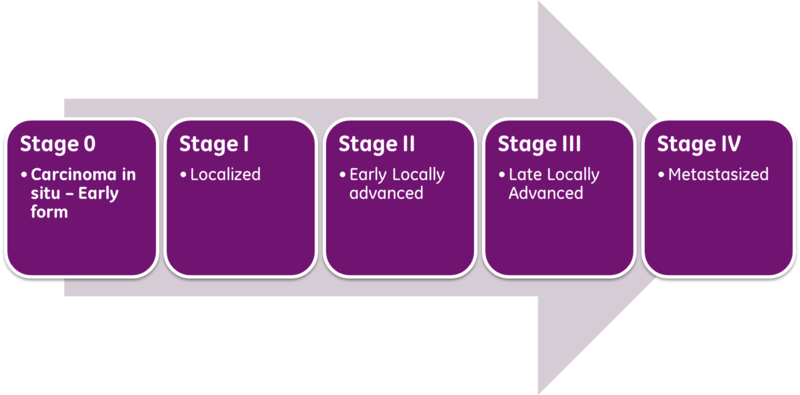 Classical prognosis of cancer patients utilizes the AJCC/UICC (American Joint Committee on Cancer / International Union Against Cancer) “TNM” classification system, in which T (Tumor) is indicative of primary tumor size and invasion properties, N (Nodes) indicates the extent of tumor invasion into draining and regional lymph nodes, and M (Metastasis), describes the presence and extent of metastatic lesions at diagnosis. The combinations of these parameters are then used to assess a patient’s stage at diagnosis and predict patient outcome. The exact parameter definitions vary for each cancer type.
Classical prognosis of cancer patients utilizes the AJCC/UICC (American Joint Committee on Cancer / International Union Against Cancer) “TNM” classification system, in which T (Tumor) is indicative of primary tumor size and invasion properties, N (Nodes) indicates the extent of tumor invasion into draining and regional lymph nodes, and M (Metastasis), describes the presence and extent of metastatic lesions at diagnosis. The combinations of these parameters are then used to assess a patient’s stage at diagnosis and predict patient outcome. The exact parameter definitions vary for each cancer type.
However, it has long been known that while the TNM system provides a fairly good estimate for patient populations overall, there is still significant heterogeneity within each stage as to tumor recurrence and ultimate outcome. This is unsurprising given this staging system evaluates only tumor characteristics and fails to account for other patient parameters. In particular, the integrity of the patient’s immune system, our inherent natural protection against tumor development, has been shown to have a significant impact on disease progression and patient outcome.
In colorectal cancer as well as other cancer types, much progress has been made in ascertaining the prognostic significance of cytotoxic CD8+ T cell infiltration into the tumor microenvironment. The densities of CD8+ T cell presence in the invasive margin (IM) and the center of the tumor (CT) have been shown to have significant prognostic value. In a study by Pages et. al. (J Clin Oncol. 2009), assessment of CD8+ T cells and CD45RO+ memory T cell densities in CT/IM tumor regions in stage I and II colorectal cancer patients significantly predicted recurrence and overall survival, showing that application of this system is particularly relevant in early stage patients to better direct treatment strategies. Multiple cytotoxic CD8+ T cell and TH1 phenotyping markers have shown prognostic significance in human cancer patients, including CD8, CD3, CD45RO, and Granzyme B expression. However, as discussed by Dr. Jerome Galon in the Oct 3, 2012 J Transl Med. article, CD8 and CD3 represent the most robust markers for adoption into routine clinical practice as CD45RO, and Granzyme B expression are intensity-dependant evaluations and thus much more technically difficult to standardize.
Thus, the proposed immunoscore relies on immunohistochemistry staining for CD8+ and CD3+ T cells in CT/IM tumor regions using standardized antibodies and protocols. Quantitative assessment of their densities is then determined and scored on whole tissue slides using specified slide scanning and staining analysis software.
In 2012, an international task force, led by Dr. Galon was established to promote the routine usage of this classification system in clinical diagnosis of cancer patients. The goals of this taskforce include feasibility and standardization of the quantitative immunohistochemistry protocol used to derive the score, worldwide validation of the immunoscore for colorectal cancer patient prognosis, as well as the application of this classification system for other cancer types. Thus, the immunoscore may soon become a standard clinical practice and aid in better prognostic stratification of patients and therapeutic guidance.
Further Reading:
http://www.immunescore.org/
Website: American Joint Committee on Cancer Staging
Cancer classification using the Immunoscore: a worldwide task force. Galon J, Pagès F, Marincola FM, Angell HK, Thurin M, Lugli A, Zlobec I, Berger A, Bifulco C, Botti G, Tatangelo F, Britten CM, Kreiter S, Chouchane L, Delrio P, Arndt H, Asslaber M, Maio M, Masucci GV, Mihm M, Vidal-Vanaclocha F, Allison JP, Gnjatic S, Hakansson L, Huber C, Singh-Jasuja H, Ottensmeier C, Zwierzina H, Laghi L, Grizzi F, Ohashi PS, Shaw PA, Clarke BA, Wouters BG, Kawakami Y, Hazama S, Okuno K, Wang E, O’Donnell-Tormey J, Lagorce C, Pawelec G, Nishimura MI, Hawkins R, Lapointe R, Lundqvist A, Khleif SN, Ogino S, Gibbs P, Waring P, Sato N, Torigoe T, Itoh K, Patel PS, Shukla SN, Palmqvist R, Nagtegaal ID, Wang Y, D’Arrigo C, Kopetz S, Sinicrope FA, Trinchieri G, Gajewski TF, Ascierto PA, Fox BA. J Transl Med. 2012 Oct 3;10:205.
The immune score as a new possible approach for the classification of cancer. Galon J, Pagès F, Marincola FM, Thurin M, Trinchieri G, Fox BA, Gajewski TF, Ascierto PA. J Transl Med. 2012 Jan 3;10:1.
The immune contexture in human tumours: impact on clinical outcome. Fridman WH, Pages F, Sautes-Fridman C, Galon J. Nat Rev Cancer 2012, 12:298-306.
In situ cytotoxic and memory T cells predict outcome in patients with early-stage colorectal cancer. Pagès F, Kirilovsky A, Mlecnik B, Asslaber M, Tosolini M, Bindea G, Lagorce C, Wind P, Marliot F, Bruneval P, Zatloukal K, Trajanoski Z, Berger A, Fridman WH, Galon J. J Clin Oncol. 2009 Dec 10;27(35):5944-51.
Image courtesy of simplyanon on Wikipedia


